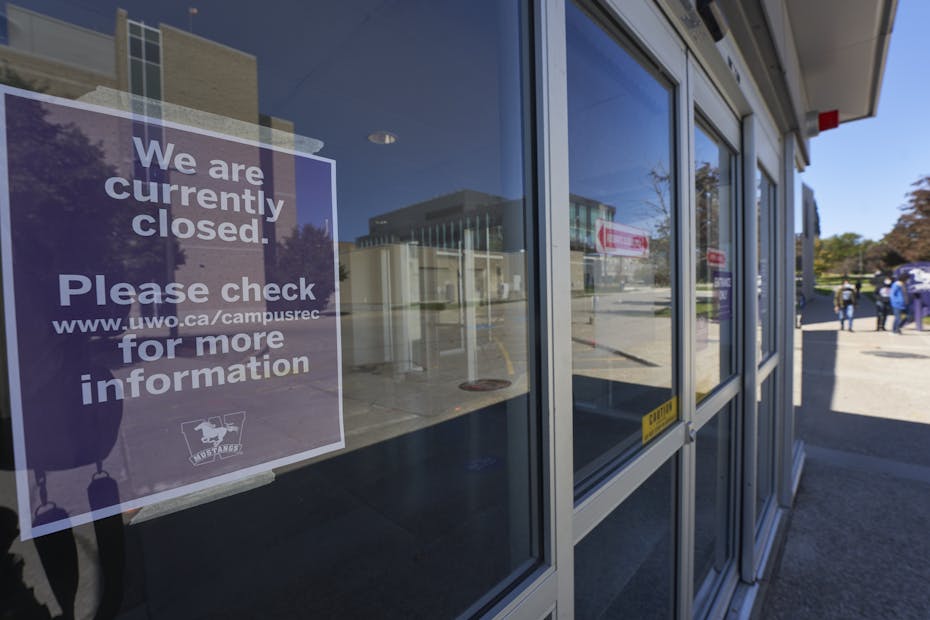
Since the onset of the COVID-19 pandemic, university faculty across Canada have been looking for ways to keep doing high-quality research and adapt to online teaching. The uncertainty of what a new normal will resemble, and the restrictions it imposes, underscore the importance of data to inform university responses.
For many university faculty, new pandemic guidelines resulted in immediate loss of access to research facilities, research participants, community partners, research-related travel, personnel or equipment. These changes came to a sector operating in an environment of finite and constrained resources with faculty experiencing occupational health impacts such as high stress.
With colleagues, I conducted a nation-wide survey that aimed to understand the broader health, social, well-being and research-related effects of the COVID-19 pandemic on tenured and tenure-track faculty in public Canadian universities.
One of the early stories of the COVID-19 pandemic was that it was a leveller, ignoring social status, ethnic status, biological sex- or gender- identity.
But our study found that the COVID-19 pandemic has differentially impacted the health, social well-being and research activity of faculty employed by public Canadian universities. Our research found the pandemic has had a disproportionately negative effect on women and racialized faculty. We think universities should urgently take measures to ensure they are not unfairly disadvantaged in their career progression.

Respondents from all provinces
We recruited survey participants via direct emails to public Canadian universities, and through snowball sampling using social media such as Twitter. Six-hundred and ninety-six faculty completed the survey. Fifty-two per cent of participants identified their biological sex as female, 45 per cent as male and three per cent reported: “prefer not to say / other.” Fifteen per cent (105 people) reported minority status based on race. All provinces in Canada were represented in the survey.
The average age of participants was 48 years and 58 per cent were married. Ten per cent of respondents held senior leadership positions. Ninety per cent were professors: assistant (29 per cent), associate (31 per cent) or full (30 per cent).
We asked faculty to classify physical activity changes during the pandemic as decreased, no change or increased. Almost half (47 per cent) reported decreases in physical activity. Similarly, 56 per cent felt socially supported and 50 per cent felt supported in their health and wellness.
We ran statistical analyses comparing men and women as well as individuals who were racialized and non-racialized. Substantially fewer women felt supported for their health and wellness from their university. Women and racialized faculty reported higher levels of stress and social isolation, and lower well-being.
Increased productivity among men
The majority of faculty (79 per cent) reported a pandemic-related disruption to balancing usual work demands with those outside of work.
We asked faculty how the pandemic had affected their research productivity by reporting decreased, no change or increased. Approximately half (53 per cent) of faculty reported less research productivity, with a greater proportion (64 per cent) of racialized faculty reporting reduced research productivity.
Most (73.3 per cent) faculty who reported increased productivity during the pandemic were men.
These data emphasize a disproportionate toll on women and racialized people. Women and racialized people experienced a higher proportion of negative impacts on health, social well-being, research activity and loss of productivity.
Caregiving, funding discrepancies
There were also gender-based discrepancies with funding and caregiving. Specifically, 71 to 75 per cent of women, compared with 25 to 29 per cent of men, reported limited access to external or internal funding. Sixty-eight per cent of women, compared with 32 per cent of men, reported family caregiver challenges.
Some faculty underscored the significant exhaustion, burnout and burden associated with caregiving:
“Emotionally, physically and mentally exhausted trying to keep the same level of productivity, while caring for and schooling two elementary school aged boys … and being a single parent.”
Our data point to a call for urgent and equitable action by faculty, leaders in universities and governments. Action to rectify inequity requires equitable representation at all levels of the university community to provide additional support to faculty research infrastructure and research capacity.
Recommendations to universities
We recommend a collaboration between HR, faculty associations and faculty at all stages of careers. They could work together to create a database that is updated in real-time to assess and monitor ongoing pandemic impacts on faculty conducting research.
The idea would be for Canadian universities to collect longitudinal data about their faculty on the effects of COVID-19 on fields of research, career progress, health and wellness. This database could serve as a monitoring tool to improve areas devoid of support. In turn, this evidence may allow universities evaluate and refine their policies and supports.
We recommend that universities pay attention to fairness and equity issues pertaining to faculty career progression and bear in mind pandemic effects. Faculty experience less burnout when processes overseeing their performance review are perceived as fair.
Annual reviews as well as tenure and promotion processes may need to be adjusted to account for the loss of productivity. Adjustments may not be as simple as extending the tenure-clock for junior faculty. Universities may need to consider new evaluation frameworks.
We recommend universities take an active approach to optimize working conditions by supporting faculty health and well-being. This could include HR departments overseeing the regular confidential monitoring of health and social wellness using online surveys on a quarterly basis, with the responses anonymized. HR could identify those not doing well and offer access to the appropriate supports.
At universities, supporting mental health and social well-being of individuals requires an individualized approach. A “one size fits all” approach will likely be insufficient within each university. Therefore, we suggest every university consider a multidisciplinary approach to address all employees’ needs equitably.
This could include dedicated professionals that are equipped to provide individualized intervention strategies that may include counselling, health care professional referrals, personal goal setting and/or health coaching.
Together, through proactive, evidence-informed decision-making and active collaboration, universities have an opportunity to ensure that faculty members’ career progression is equitable.![]()
Jennifer Davis, Assistant Professor, Faculty of Management, University of British Columbia
This article is republished from The Conversation under a Creative Commons license. Read the original article.










